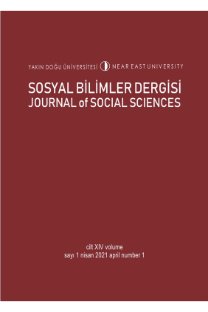A pioneer in Ottoman sociology: Prince Sabahattin
Bu makale Prens Sabahattin’in Tanzimat ile başlayan Osmanlı entellektüel gelişimindeki yerini incelemektedir. Prens Sabahattin, bir liberal olarak siyasetteki duruşundan çok sosyal bilimlerdeki yerine göre bir aydın olarak ele alınmıştır. Liberalizmin ana maddeleri olan adem-i merkeziyet ve şahsi teşebbüse inanarak İngiliz sistemiyle yakından ilgilendiği için Prens Sabahattin kendi zamanında anlaşılamamış bir aydındır. Siyasette aktif olarak yer almamasına karşın düşünceleri liberal bir muhalefet partisi (Ahrar) oluşturmuştur. Prens Sabahattin’in asıl etkisi, toplumun gelişimi için yukarıdan uygulanan ihraç edilmiş reformların yerine, kişisel gelişimi savunmasıdır. Fransız sosyolog Le Play’den etkilenerek yönetim biçimi, eğitim ve köy gelişimi gibi sosyal problemlere çözüm aramış ve Meslek-i İçtimai programıyla Osmanlı aydınları arasında ilk defa sistemli bir program uygulamıştır. Anglo-Sakson sisteminin üstünlüğünü savunduğu programında, tecemmüi (komuniter) yerine infiradi (ferdiyetçi) toplum yapısını benimsemiş ve aile ve toplum ilişkileri yerine bireysel gelişimi ön planda tutan İngiliz eğitim sisteminin önemini vurgulamıştır. Prens Sabahattin köylerin gelişimini göz önünde tutan ve programında bunu da kapsayan ilk aydın olduğu için 1940larda gelişen Köy Enstitülerinin oluşumu Prens Sabahattin’e kadar getirilebilir. Mahmud Celaleddin Paşa ve II. Abdülhamid’in kız kardeşi Seniha Sultan’ın oğlu olarak kendisinin Osmanlı toplumuna mesafesi gözden kaçırılamaz, fakat çağdaşlarına göre sosyal programı kalıcı ve ileri görüşlü olması sebebiyle Prens Sabahattin, Osmanlı/Türk siyasetinde ve sosyal bilimlerinde iz bırakmıştır.
This article examines Prince Sabahattin’s place in Ottoman intellectual development that started to flourish in Tanzimat era. Prince Sabahattin is portrayed with his intellectual capacity and his lead in social sciences, rather than his political stance. As an intellectual, Prince Sabahattin was misunderstood in his own period due to his close association to Anglo-Saxon system with decentralization and private initiative issues that were pillars of liberalism. Although he did not involve actively in politics, he influenced the formation of opposition party, Ahrar (Liberal Party). But his main impact was putting individual development to the core for the advancement of the society, which, according to him, was possible only by inner dynamics, rather than applying top-down reforms. For this, he outlined a social program, Meslek-i İçtimai (Profession of Sociology), which was the first attempt to look for the solutions of social problems, like administration, education and village development in a systematic way that he learned from the French sociologist, Le Play. In this program, which was shaped around the belief in the superiority of Anglo-Saxon system, he emphasized the importance of individualistic form of society, rather than communitarian one and for the advancement of society, he put the British type of education to the core, which led the prospering of individual by himself rather than kinship ties or community bonds. The Village Institutes of the 1940s could be traced back him, since he was the first one to mention the importance of village development and was included in his program. Although his distance to Ottoman society could not be ignored because of his belonging to the Ottoman dynasty, as a son of Mahmud Celaleddin Paşa and Seniha Sultan (Abdulhamid II’s sister), compared to his contemporaries, his program was a permanent and a projectionist one, which left an imprint in both Ottoman/Turkish politics and social sciences.
___
Altan, Çetin. "Adem-i Merkeziyet'çi Prens Sabahattin ve Türkiye'de Yaşam Kalitesi," Milliyet, 3 March 2007.Bayram Bayraktar, "Günümüzde Yeniden Değerlendirilmesi Gereken Bir Düşünür: Prens Sabahattin Bey," Ankara Üniversitesi Dil ve Tarih-Coğrafya Fakültesi Tarih Bölümü Tarih Araştırmaları Dergisi, v. 18 n: 29, 1996.
Berkes, Niyazi. The Development of Secularism. Montreal: McGill University Press, 1964.
Demolins, Edmond. Anglo-Saxon Superiority: To What It is Due. Paris: F-Didot. Publishing, 1972.
Ergün, Mustafa. "Prens" Sabahattin Bey'in Eğitim Üzerine Düşünceleri, Kuramsal Eğitimbilim, 1 (2), 1-9, 2008.
Fındıkoğlu, Z. Fahri. Le Play Mektebi ve Prens Sabahattin, Istanbul: Fakülteler Matbaası, 1962.
Fındıkoğlu, Z. Fahri. Sosyoloji Konferansları- 1960-61. Istanbul: Istanbul University, 1962.
Georgeon, François. "Ulusal Hareketin İki Lideri: Ziya Gökalp ve Yusuf Akçura," Osmanlı-Türk Modernleşmesi, Istanbul: Yapı Kredi Yayınları, 2006.
Hanioğlu, Şükrü. Preparation for a Revolution. Oxford: Oxford University Press, 2001.
Hanioğlu, Şükrü. The Young Turks in Opposition. Oxford: Oxford University Press, 1995.
Karaömerlioğlu, M. Asım. "The Village Institutes Experience in Turkey," British Journal of Middle Eastern Studies, vol.25, no. 1, (1998, May): 47-73.
Karpat, Kemal "The Transformation of the Ottoman State, 1789-1909," International Journal of Middle East Studies, no.3 (1972, July): 243-281.
"Liseler Nasıl Islah Edilmelidir?,"Yeni Adam, 29 November 1934.
Livaneli, Zülfü. Leyla'nın Evi. Istanbul: Remzi, 2006.
Marjolin, Robert. "French Sociology- Comte and Durkheim," The American Journal of Sociology, n. 5 ( 1937, March): 693-704.
Pamuk, Orhan. Cevdet Bey ve Oğulları, Istanbul: İletişim, 2006.
Prens Sabahattin, Türkiye Nasıl Kurtarılabilir?, 1950.
Ramsaur, Ernest. The Young Turks: Prelude to the Revolution 1908. Princeton: Princeton University Press, 1957.
Sazak, Derya. "Meşveret," Milliyet, 11 December 2004.
Tütengil, C. Orhan. Prens Sabahattin, Istanbul: Istanbul Matbaası, 1954.
"Une Lettre du Prince Sabaheddine," Bulletin De la Société Internationale de Science Sociale, 6 November 1914.
- ISSN: 1986-1303
- Yayın Aralığı: Yılda 2 Sayı
- Başlangıç: 2008
- Yayıncı: Yakın Doğu Üniversitesi
Sayıdaki Diğer Makaleler
Asiatic mode of production and the Ottoman Empire
Kıbrıslı Türk siyasal seçkinlerin demografik profilleri
Oedipus at Colonus as a divine comedy
OECD ülkeleri vergi sistemi esnekliğinin panel eşbütünleşme testleri ile analizi
C. Erdem HEPAKTAN, SERKAN ÇINAR
A pioneer in Ottoman sociology: Prince Sabahattin
The İslamist challenge in Egypt
Manuel Catells'i yeniden okumak: Küresel ağ hareketleri yaklaşımının eleştirel bir değerlendirmesi
Birinci sınıf mülki adare amirliği düzenlemesi üzerine eleştirel bir değerlendirme
